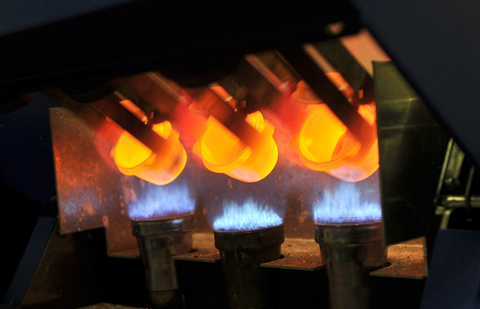The Prius hybrid automobile is popular for its fuel efficiency, but its electric motor and battery guzzle rare earth metals, a little-known class of elements found in a wide range of gadgets and consumer goods.
That makes Toyota’s market-leading gasoline-electric hybrid car and other similar vehicles vulnerable to a supply crunch predicted by experts as China, the world’s dominant rare earths producer, limits exports while global demand swells.
Worldwide demand for rare earths, covering 15 entries on the periodic table of elements, is expected to exceed supply by some 40,000 tonnes annually in several years unless major new production sources are developed. One promising US source is a rare earths mine slated to reopen in California by 2012.

PHOTO: REUTERS
Among the rare earths that would be most affected in a shortage is neodymium, the key component of an alloy used to make the high-power, lightweight magnets for electric motors of hybrid cars, such as the Prius, Honda Insight and Ford Focus, as well as in generators for wind turbines.
Close cousins terbium and dysprosium are added in smaller amounts to the alloy to preserve neodymium’s magnetic properties at high temperatures. Yet another rare earth metal, lanthanum, is a major ingredient for hybrid car batteries.
Production of both hybrids cars and wind turbines is expected to climb sharply amid the clamor for cleaner transportation and energy alternatives that reduce dependence on fossil fuels blamed for global climate change.
Toyota has 70 percent of the US market for vehicles powered by a combination of an internal-combustion engine and electric motor. The Prius is its No. 1 hybrid seller.
Jack Lifton, an independent commodities consultant and strategic metals expert, calls the Prius “the biggest user of rare earths of any object in the world.”
Each electric Prius motor requires 1kg of neodymium, and each battery uses 10kg to 15kg of lanthanum. That number will nearly double under Toyota’s plans to boost the car’s fuel economy, he said.
Toyota plans to sell 100,000 Prius cars in the US alone for this year, and 180,000 next year. The company forecasts sales of 1 million units per year starting next year.
As China’s industries begin to consume most of its own rare earth production, Toyota and other companies are seeking to secure reliable reserves for themselves.
Reuters reported last year that Japanese firms were showing strong interest in a Canadian rare earth site under development at Thor Lake in the Northwest Territories.
A Toyota spokeswoman in Los Angeles said the automaker would not comment on its resource development plans. But media accounts and industry blogs have reported recently that Toyota has looked at rare earth possibilities in Canada and Vietnam.

MORE VISITORS: The Tourism Administration said that it is seeing positive prospects in its efforts to expand the tourism market in North America and Europe Taiwan has been ranked as the cheapest place in the world to travel to this year, based on a list recommended by NerdWallet. The San Francisco-based personal finance company said that Taiwan topped the list of 16 nations it chose for budget travelers because US tourists do not need visas and travelers can easily have a good meal for less than US$10. A bus ride in Taipei costs just under US$0.50, while subway rides start at US$0.60, the firm said, adding that public transportation in Taiwan is easy to navigate. The firm also called Taiwan a “food lover’s paradise,” citing inexpensive breakfast stalls

TRADE: A mandatory declaration of origin for manufactured goods bound for the US is to take effect on May 7 to block China from exploiting Taiwan’s trade channels All products manufactured in Taiwan and exported to the US must include a signed declaration of origin starting on May 7, the Bureau of Foreign Trade announced yesterday. US President Donald Trump on April 2 imposed a 32 percent tariff on imports from Taiwan, but one week later announced a 90-day pause on its implementation. However, a universal 10 percent tariff was immediately applied to most imports from around the world. On April 12, the Trump administration further exempted computers, smartphones and semiconductors from the new tariffs. In response, President William Lai’s (賴清德) administration has introduced a series of countermeasures to support affected

CROSS-STRAIT: The vast majority of Taiwanese support maintaining the ‘status quo,’ while concern is rising about Beijing’s influence operations More than eight out of 10 Taiwanese reject Beijing’s “one country, two systems” framework for cross-strait relations, according to a survey released by the Mainland Affairs Council (MAC) on Thursday. The MAC’s latest quarterly survey found that 84.4 percent of respondents opposed Beijing’s “one country, two systems” formula for handling cross-strait relations — a figure consistent with past polling. Over the past three years, opposition to the framework has remained high, ranging from a low of 83.6 percent in April 2023 to a peak of 89.6 percent in April last year. In the most recent poll, 82.5 percent also rejected China’s

PLUGGING HOLES: The amendments would bring the legislation in line with systems found in other countries such as Japan and the US, Legislator Chen Kuan-ting said Democratic Progressive Party (DPP) Legislator Chen Kuan-ting (陳冠廷) has proposed amending national security legislation amid a spate of espionage cases. Potential gaps in security vetting procedures for personnel with access to sensitive information prompted him to propose the amendments, which would introduce changes to Article 14 of the Classified National Security Information Protection Act (國家機密保護法), Chen said yesterday. The proposal, which aims to enhance interagency vetting procedures and reduce the risk of classified information leaks, would establish a comprehensive security clearance system in Taiwan, he said. The amendment would require character and loyalty checks for civil servants and intelligence personnel prior to